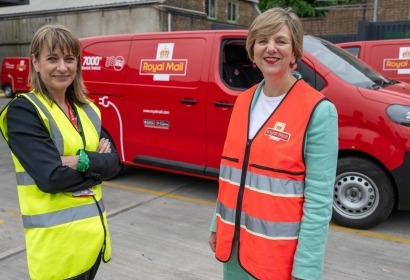
Royal Mail has celebrated this milestone by announcing that it will invest in 1,800 more electric vans and supporting charging infrastructure over the next year. Almost half of the new vans will be built in the UK at Stellantis’s Ellesmere Port plant.
Lilian Greenwood, Member of Parliament for Nottingham South and Minister for the Future of Roads, unveiled the 7,000th electric vehicle at South Lambeth Delivery Office, which delivers to the Houses of Parliament and addresses across Victoria, Chelsea, Lambeth and South Kensington.
Royal Mail purchased its first 100 electric vehicles in December 2017, deployed in delivery offices across the UK. Now, almost a quarter of Royal Mail’s delivery offices use electric vehicles for deliveries and collections. Nearly all of the company’s electric vans are charged on-site across its property estate via a purchased 100% renewable electricity supply and all are zero-emissions at the tailpipe.
Royal Mail has also recently welcomed its first-ever electric trucks, in collaboration with Magtec. The trial will put the two new 19-ton vehicles through their paces in real-world conditions.
Alistair Cochrane, Royal Mail’s Chief Operating Officer, said, “Today, we’ve hit a major milestone in our journey to reach Net-Zero by 2040. We’ve strengthened our position as the UK’s largest electric delivery fleet and our investment in 1,800 more zero-emission vans will help us maintain this in the future. Royal Mail is going the extra mile to decarbonise its fleet, with huge benefits for our posties, our customers and the planet.”
Lilian Greenwood MP, Minister for the Future of Roads, said, “Today’s unveiling of its 7,000th EV is a crucial milestone for Royal Mail as it continues to decarbonize its fleet of iconic red vans.
“This Government is providing £2.3bn to help industry and consumers make a supported switch to EVs, delivering our Plan for Change by driving investment and creating jobs to put money in the pockets of hardworking people and secure our future.”
Royal Mail has the lowest reported carbon emissions per parcel of any UK delivery company and aims to maintain this position in the long term. The company’s ‘Steps to Zero’ environment strategy set a goal of achieving Net-Zero by 2040. The company has already reduced Scope 1 and 2 emissions by 18% in four years, with a target to achieve a 50% reduction by 2030.

